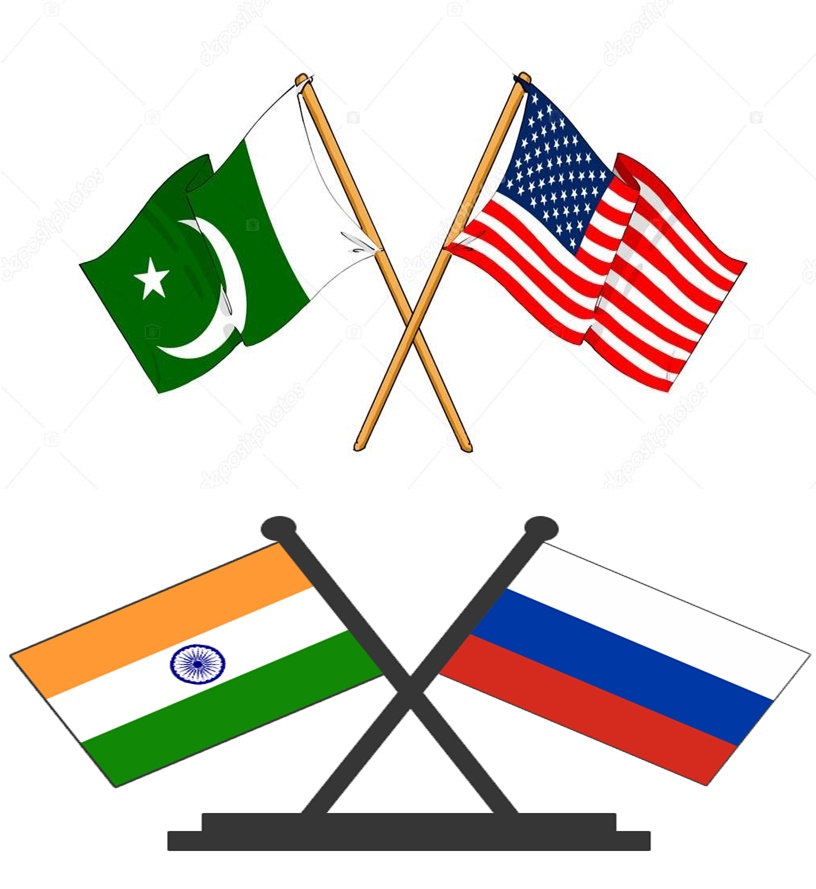
How Russia-India Relations are Reshaping the Pak-US Relations? By Musavir Barech
This year, Pakistan and the US have been celebrating their 75th anniversary of a bilateral relationship. Throughout this time, America-Pakistan relations have been on a roller coaster and were seen mostly through the prism of their relations with India, China, and the former USSR. Later on, Afghanistan took the center stage in Pak-US relations.
“There is some self-interest behind every friendship. There is no friendship without self-interests. This is a bitter Truth” ― Chanakya
This year, Pakistan and the US have been celebrating their 75th anniversary of a bilateral relationship. Throughout this time, America-Pakistan relations have been on a roller coaster and were seen mostly through the prism of their relations with India, China, and the former USSR. Later on, Afghanistan took the center stage in Pak-US relations.
n retrospect, despite the closeness in relations with Pakistan, when America decided to help India in the 1962 Sino-India war and when the USA didn’t come to help Pakistan during the 1965 and 1975 wars with India, Pakistan reviewed its foreign policy. Pakistan then decided to till its foreign policy towards the eastern powers i.e, China and the former USSR. To fulfill that objective, Field Marshal Ayub Khan and premier Zulfiqar Ali Bhutto visited China and USSR to pull out Pakistan from the complete sphere of western influence and laid the foundation stone of Pakistan’s relationship with the USSR and China.
Understanding the matter better Cutting it to the near past, when the Chinese launched the China-Pakistan Economic Corridor, the US, and its strategic partner in the Indo-Pacific framework—India came forward in criticism of this flagship project of the Belt and Road initiative. Alex wells the former US Secretary of State for the South Asian region publicly warned Pakistan of the allegedly Chinese debt trap. Some sources disclosed that America also used the international financial institution to pressurize Pakistan, particularly the International monetary fund IMF.
However, with the close defense corporations between India and Russia and the onslaught of the Russian-Ukraine crisis, the dependency of Pak-US relations on their relations with China and India morphed into the dependency of their relations on India-Russian relations.
India despite the threat of secondary sanction, purchased the S400 missile air defense system which raised eyebrows in the policy maker sitting in the Biden administration. Moreover, in spite of the boycott of the St Petersburg Economic forum by the American led western countries, India attended the dialogue Resultantly, India was not invited to join the AUKUS—a trilateral security pact between Australia, the United Kingdom, and the United States to counter the rising influence of China in the Indo-Pacific by mainly providing nuclear submarines to Australia.
Despite that India is a strategic partner of the west in the region and India is in the quest to include nuclear submarines in its defense India was not invited to join this pact.
Intriguingly, during the Russia-Ukraine tensions where western countries discouraged the purchasing of Russian oil and pledged to ban Russian oil this year last, Russia became the second highest importer of oil surpassing the Kingdom of Saudi Arabia. Previously, Russia was on the fourth spot in terms of oil importers. For this reason, America time and again warned and blame India for funding the Russia- Ukraine war but India was not ready to turn down the offer of Russian cheap oil.
The above-mentioned events paved the way for the reshaping of Pak- US relations. The US gave a strong message to India again exploiting the weaknesses of Pakistan. This is also pinpointed by the foreign minister of India Dr, SJ Shankar in one of his interviews where he highlighted that US support to Pakistan contributed to the Pakistan-India tensions.
The way forward It is pertinent to mention that despite the getting status of a Strategic Partner the United States still does not have an Ambassador in New Delhi which clearly gives a strong message to India about the resentment of the US toward India-Russia relations. On contrary, Donald Blome was sworn in as the U.S. Ambassador to Pakistan on April 11, 2022. Intriguingly, the appointment of Ambassador Donald Blome came when former Premier Imran Khan was in power who in the last stages of his rule adopted anti-America policies.
Similarly, in the near past, the United States was not ready to accept the credentials of the newly appointed ambassador of Pakistan to the US, Sardar Masood, due to the strong resistance from the anti- Pakistan and Anti Kashmiri Indian lobby in America. The Indian lobby in Washington is using the delay as an opportunity to block Mr. Khan’s appointment by claiming that he supports the Kashmiri freedom movement. However, the table turned, and United States President Joe Biden with unusual delay finally accepted the credential of Pakistan’s ambassador to the US Sardar Masood. Surprisingly, the embassy gained the approval that too on February 5, which is recognized as Kashmir Solidarity Day by Kashmiris and Pakistanis around the world.
In nutshell, India-Russia relations are providing an opportunity for crippling Pakistan-US relations and we must exploit this by reviving our relations with the West in general and with the US in particular.
The writer is an M.Phil. Scholar at Government College University, Lahore. The views expressed by the writers do not necessarily represent Global Village Space’s editorial policy.
How Russia-India Relations are Reshaping the Pak-US Relations? By Musavir Barech How Russia-India Relations How Russia-India Relations
Source: https://www.globalvillagespace.com/how-russia-india-relations-are-reshaping-the-pak-us-relations/


